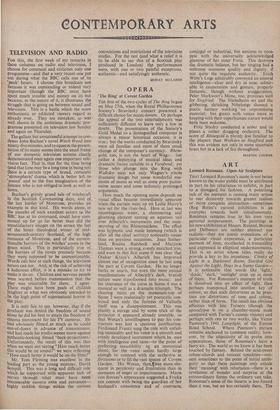CONTEMPORARY ARTS
To.ELthEi VtrIfiOrsNt weAekNElf naRADIOin ese columns on radio and television, I hoose for comment and criticism only one rogramme—and that a very recent one put ut during what the BBC calls one of its peak' hours. I choose this broadcast not cause it was outstanding or indeed very ,. portant (though the BBC must have pent much trouble and money on it) but cause, in the nature of it, it illustrates the truggle that is going on between sound and television. This is a battle which the more nthusiastic or addicted viewers regard as eady over. They are mistaken, as was Well shown in the ambitious dramatic pro- amme presented on television last Sunday d again on Thursday.
The gallant but unsuccessful attempt to con- nse John Buchan's novel Witch Wood into 'nety-five minutes, and to squeeze the presen- tion of its many scenes into the small frame f our domestic television screens clearly monstrated once again one important tele- vision fact. That is, that for the time being and that time may be a long time in being yet) ere is a certain type of broad, romantic atmospheric' drama which is better left to `sound' and to the free imagination of the listener who is not obliged to look as well as listen.
Buchan's grimly grand tale of witchcraft in the Scottish Covenanting days, and of the last battles of Montrose, provides an example in this kind. His words alone, in the mouths of such excellent actors rts the BBC has at its command, could have sum- moned up for us far better than did the unsatisfactory images on the screen the feel of the bitter theological winter of mid- seventeenth-century Scotland, of the high romance of Montrose, and of the unmen- tionable horrors of the witches' coven in the green wood. This is particularly true of the horrors of the coven precisely because they were supposed to be unmentionable. Words can hint at such things, the television screen can not. And, at the risk of achieving ludicrous effect, it is a mistake to try to Make it do so. Children and nervous people Were warned before transmission that the Play was unsuitable for them. I agree. There might have been peals of childish laughter at what was obviously intended to be the high point of supernatural horror in the play.
It is only fair to say, however, that if the producer was denied the freedom of sound alone he did his best to attain the freedom of cinema movement for his TV cameras. He had obviously filmed,as much as he could out-of-doors in advance of transmission, and had made his studio scenes move against authentic-looking filmed 'back-projections.' Unfortunately, the result of this was' that When we were not saying "How much better this would be on sound!" we were reflecting "How much better it would be.on the films!"
Mr. Tom Fleming was excellent in the leading part as the young minister, David Sempill. This was a long and difficult role Which he supported with apparent lack of nerves through what must have been innumerable camera exits and entrances— 'highly ticklish things within the curious conventions and restrictions of the television studio. For the rest (and what a relief it is to be able to say this of a Scottish play produced in London) the performances were, with one or two painful exceptions, authentic—and satisfyingly authentic.
MORAY MCLAREN


































 Previous page
Previous page